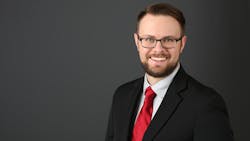- Alma Mater: Michigan Technological University
- Favorite book: “Blue Highways: A Journey into America” by William Least Heat-Moon
- Favorite TV show: “The Good Place”
- Favorite movie: “Forrest Gump”
- Favorite hobby(s): Curling, hiking, watching soccer and hockey
- Fun fact about yourself: My wife and I have a corgi named Quincy Danger.
- Favorite station or stop that you have ever visited or frequent (and why): The Central Station in Cologne has a giant glass train shed that glows over the River Rhine as trains glide over the Hohenzollern Bridge at the east end of the station.
- Favorite route you have ever ridden or frequent (and why): The A-Line arterial BRT in Minneapolis and St. Paul brought a new level of bus transit that improved reliability, comfort and safety. The route also has great views while crossing the Ford Bridge of the only gorge on Mississippi River that flows between the cities.
Brandon Maurisak’s first experience on rail transit was a trip on what was then a two-year-old Hiawatha Light Rail (METRO Blue) line between Mall of America and Minneapolis, Minn., during a college pep band trip to play at a conference hockey tournament. Maurisak said the experience opened his world view of how transit can impact cities.
Public transit and rail electives were offered as part of the civil engineering degree program at Michigan Tech, which Maurisak credits for exposing him to characteristics of transit modes, route planning and system operations. His early exposure to rail transit and his professional life came full circle when, in 2013, following his recruitment by AECOM, he worked on the design of an extension of the system kick started by the Hiawatha.
Maurisak is described by colleagues as steadily reliable, dedicated and eternally upbeat, qualities that bode well in the transit industry where major transit projects can take decades between initial planning and opening day. Maurisak says it can be challenging to see the light at the end of the tunnel while projects wrestle with political, budgetary, technical or other issues. He points to one project he worked on, METRO Green Line Extension, which experienced numerous pauses due to political pressure and budgetary challenges but is expected to begin operation in 2023 – a full decade after he began working on the project.
Maurisak has taken on greater responsibilities within AECOM’s Portland, Ore., office following senior staffing changes where he is now involved in key business development decisions and management of department staff. To improve communications on a major project assignment, he took the initiative to assist the project manager and established regular meeting times to improve communication within the team, developed an issues and deliverables tracking system and managed resource allocations.
Outside of his day job, Maurisak is involved in the American Public Transportation Association (APTA), from which he graduated in the second APTA Emerging Leaders Program in 2015 and has been involved in the association’s Rail Transit and Streetcar committees. Previously he served as an appointed member for both the Duluth Transit Authority Board of Directors and the Metropolitan Interstate Council Policy Board.
“I’ve been fortunate to work on transit projects across the country and I enjoy interacting with the public about the projects in the community. Whether its teaching a child about what the construction workers are doing on the station renovation in their neighborhood or discussing future projects with neighbors during project open houses, it’s energizing to discuss projects that I’ve worked on with people who are engaged in their communities.”
“For me, all other accomplishments will come second to graduating from college. In my family, I was part of the first generation that had college as a viable option and the day I completed my degree felt like validation for my family who believed I could do anything.”
“Don’t be afraid to take opportunities outside your comfort zone. Often it is a struggle that is more beneficial to growth than success.”
“[What I like about the industry is] being able to experience the impacts of your work on the personal level. In other fields within Civil Engineering you’re often disconnected from a project’s results, but in transit you’re able to interact directly with those benefit most from it.”



